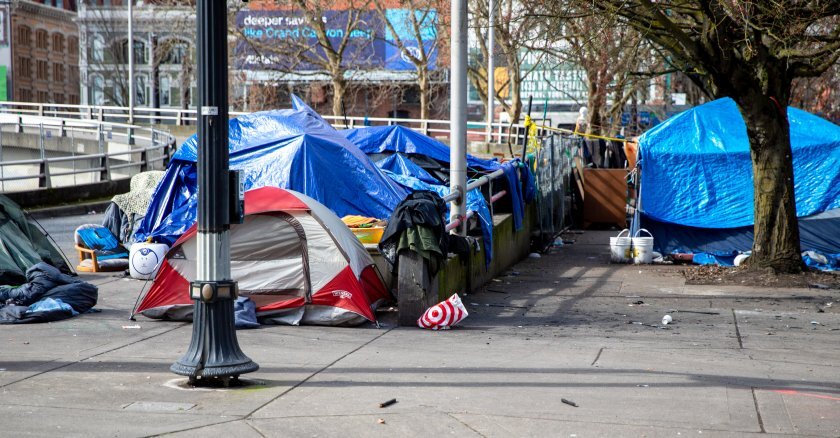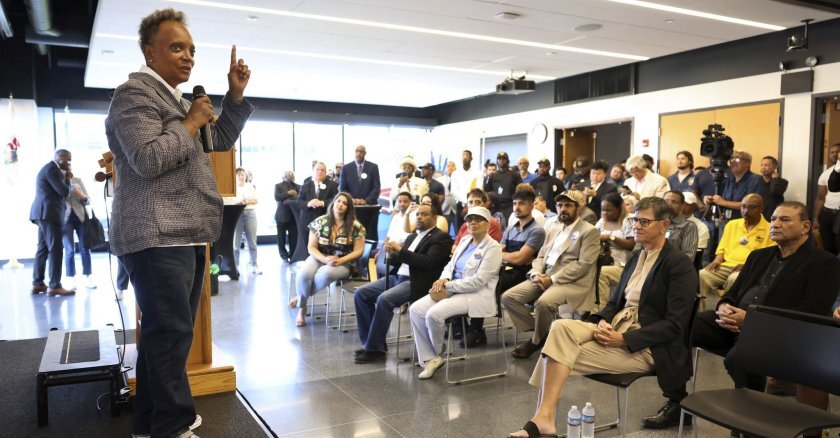Even the popular TV series Portlandia, which for eight seasons made fun of the city’s leftist hipsterism — it called Portland “a city where the young go to retire” — came off as something of a grudging compliment. You could find lots of ways to make fun of Portland, but you couldn’t truly disparage it.
That’s why it’s painful to notice that in the last couple of years, Portland has become an uncharacteristically depressed and discouraging place. “Everybody hates Portland,” the headline of a piece written for the local public radio station proclaimed last year. Just a few weeks ago, another local news outlet lamented that the city “has switched from attracting new arrivals to repelling its current citizens.” The city’s senior congressman, an unapologetic civic booster whose public career stretches back 50 years, conceded in 2022 that “Portland is broken.” A city commissioner lamented in an email that “Portland is persevering as a community through one of the most terrible periods in our city’s history.”
One survey last year found that 8 percent of the residents thought the city was heading in the right direction. A few years ago, that number sometimes hit the 60s.
WHY IN THE WORLD IS THIS HAPPENING to a shining exemplar of modern urbanist success? There are lots of answers out there, although perhaps not any fully convincing ones.
When residents talk about Portland’s problems, they almost always mention three things: crime, homelessness and taxes. Sometimes they mention them all at once. “In Portland,” the local newspaper Willamette Week summed up recently, “many liberals are dodging stray bullets, losing catalytic converters to thieves and sidestepping tents. Then they open their tax bills.”
The crime issue is a matter of statistics. In 2022, Portland had 96 homicides, far more than the 10-year average of 38 and nearly twice as many as Seattle, a larger city with which it is often compared. Portland had about 11,000 car thefts, up from 9,000 just the year before. The numbers aren’t as bad as those in some large eastern cities, but they have come as a shock to longtime residents who always considered theirs a safe city. Sometimes it isn’t the number of offenses that matters most — it’s the rate of increase.
There are said to be 800 homeless camps in the city. One local paper reported that teachers were sometimes bringing kids in from recess because fires in the nearby homeless camps had created toxic smoke.
The crime and homelessness concerns are magnified by the fact that local taxpayers feel they aren’t getting decent results from their high tax bills. A report by the consulting firm Ernst and Young showed Portland with a combined state and local individual income tax rate of nearly 15 percent — second only to New York City’s.
Some of the discontent sounds hyperbolic: One recent Internet critic complained about “legions of homeless who will not accept shelters and are happily accommodated with taxpayer-provided tent, sleeping bags, tarps and supplies.” But the fact that people are saying these things — and not just a few people — suggests what the city is having to deal with.
It is also dealing with warnings about residents leaving the city. Portland has lost population for the last three years. The losses are small, but here again, it’s the rate of change that contributes to the malaise. For a long time, Portland took it for granted that it was a growing city. Some residents feared that it was growing too much. Now the complaint is that people are moving out.
THE PUZZLE isn’t so much a question of what is happening, but why it is happening. The first culprit that critics point to is bad leadership. I discussed this recently with a prominent business executive with decades of experience in state and local politics, and he pointed his finger squarely at the region’s elected officials — mayors, Metro Council board members and county commissioners who are decent and well-meaning but somehow unable to collaborate. “What sets us apart,” he wrote, “is the glaring way leaders (elected, appointed, civic) failed to rise to the occasion, in even the most basic ways, while exhibiting a fair amount of hubris (“we have our own special way”… even as we watch what is special slip away). … Collectively they were incapable of working together constructively.”
From this widely shared perspective, a cohesive set of leaders might have dealt effectively with a whole array of specific local problems. They failed to impose discipline on the police, and left an impression of improper law enforcement leniency, even as they diverted resources away from effective policing; they had no coherent program at all to deal with homelessness; they dithered as civic-minded businesses packed up and left town, complaining that their employees no longer felt safe.
This is not just conservative carping; it comes even from local activists generally sympathetic to the progressive politics for which Portland has long been known. But one can’t resist speculating that broader forces are at work as well. Some of Portland’s malaise can be found as well in Seattle and San Francisco. Seattle too has been losing population, especially families with school-age children. A Seattle newspaper columnist wrote recently that “it’d be blind not to acknowledge — as Portland now appears to be doing — that the quality of life in the city has plunged as well.” San Francisco voters, traumatized by recent increases in crime and homelessness, moved decisively last year to remove a public prosecutor who had established a reputation for law enforcement laxity and reduced incarceration of criminals. Plagued by hard times in its high-technology business sector, San Francisco has perhaps the most forlorn downtown of any major American city.
ONE MIGHT CONCLUDE FROM THIS EVIDENCE that the malaise is to a large extent a West Coast problem. The mild climate of West Coast cities attracts a disproportionately large homeless population. The weather is not a leadership issue, but a failure to deal effectively with a profusion of homeless camps clearly is.
It might be useful to speculate about something even larger: Perhaps there is such a thing as a city being too successful. Decades of peace, prosperity and plentiful amenities may lead not only to managerial complacency but to a panicked reaction among the citizens to even modest increases in such things as crime and homelessness.
It’s possible to detect some of those feelings right now in Austin, Texas, a city that can’t be accused of having a year-round mild climate. Austin’s population has grown exponentially over the past decade — it is now above the million mark. That is a problem most American cities would love to have, but it has left many of its residents complaining that one of America’s most livable cities isn’t so livable anymore. “I know Austin prides itself in its ‘weirdness,’ difference from the rest of the state and being welcoming to everyone,” a typical Internet critic wrote recently. “But there are just too many people flooding the city when it already doesn't have any space. I think the city is losing its identity.” In 2022, for the first time in more than a decade, Austin fell out of the “10 best places to live” category in the annual survey byU.S. News. As recently as 2019, it was No. 1.
The ray of hope for Portland, at least viewed from a distance, is that its most conspicuous problems, if not easily solvable, are amenable to relief. The homeless will not disappear, but a cohesive local government can do something about the 800 homeless camps. No city can fully control its crime rate, but well-organized and well-resourced policing can make a serious dent in the numbers. Competent overall management should be able to nudge the tax burden down in a way that the taxpayers will notice. Last November, the city’s voters opted to replace their cumbersome commission form of government with a strong city manager and a less-limited mayoralty. That should help, although it will require a degree of cooperation among the leaders that has been absent until now.
Plenty of American cities are in worse shape. There’s no reason why Portland has to be one of them. There’s still a lot about it to like.
Related Content














